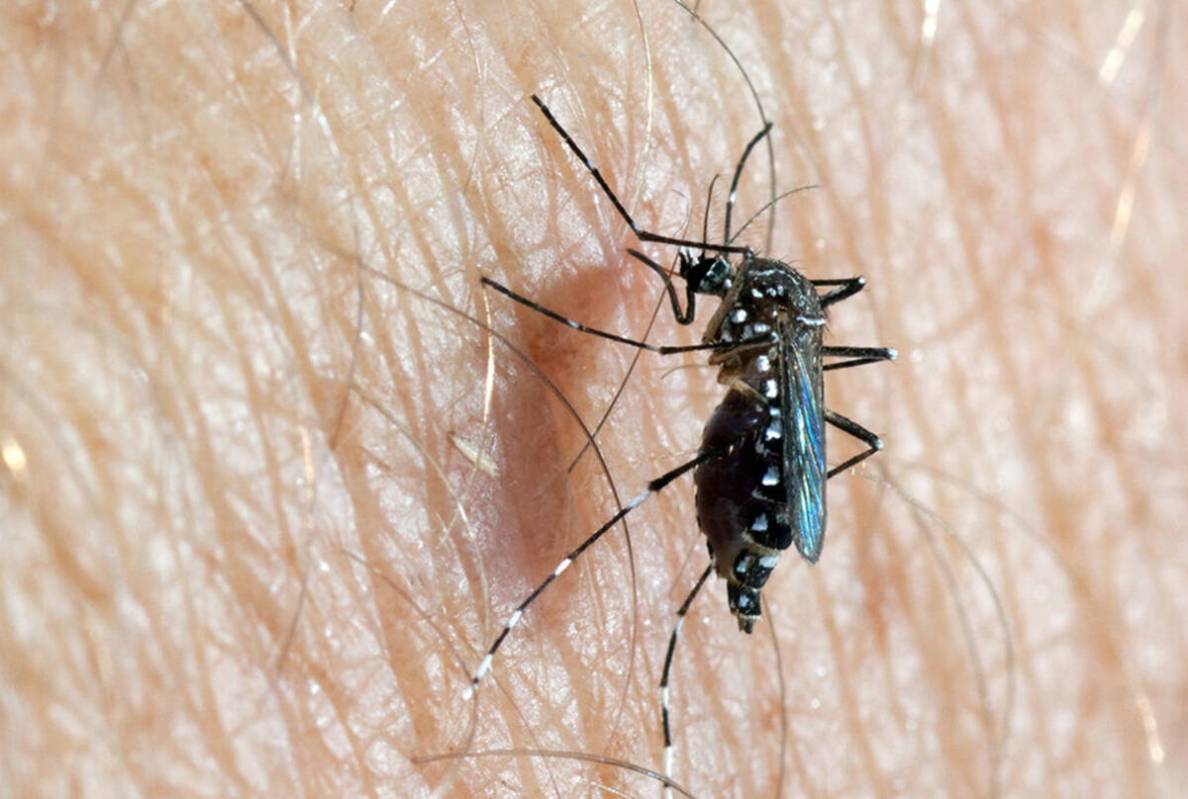Valley rain brings water, and this potentially deadly airborne danger

First, the valley saw plenty of rain. Now come nasty mosquitoes, the worst of which may yet to be seen.
Beware the Aedes Aegypti.
The aggressive breed of mosquito likes humans as its host and back yards as its breeding ground and has been spreading across the Las Vegas Valley, says a Southern Nevada Health District environmental supervisor.
Recent rainy weather adds to their numbers, say pest control providers.
A mosquito bite can cause disease and death.
Mosquitoes are responsible for killing more people than any other creature in human history as they spread diseases such as malaria, dengue, West Nile, yellow fever, Zika, chikungunya and lymphatic filariasis, according to the Centers for Disease Control and Prevention.
In 2021, there were 1,035 West Nile human cases in the United States and 79 deaths, according to Vector Disease Control International.
The Aedes Aegypti breed “is very persistent and it bites frequently … and its primary food source is people,” said Vivek Raman, SNHD environmental health supervisor.
Aedes Aegypti can spread the dengue virus that causes several illnesses, including yellow fever virus, chikungunya virus and Zika virus, Raman said.
“The breed is known around the world and now we are just seeing it in Vegas,” Raman said. “It is very adaptable to an urban environment.”
Surveillance of mosquito species is critical as it can be an early warning for new disease introduction to Las Vegas.
The health district started trapping for the breed, which migrated from Mexico, California and Arizona, in 2014. The first such mosquito was found in Las Vegas in 2017.
In 2021, the breed was found in six ZIP codes in the valley. Last year, it was found in 12 ZIP codes. So far his year, it’s been spotted in 31 ZIP codes.
“It’s inevitable that it will be everywhere soon,” Raman said. “We have seen a shift of species, and that goes hand in hand with increased calls for service.”
One commercial pest control service says rain brings all sorts of bugs and business.
“Water equals bugs, so when we have added moisture we have a lot more calls,” Joey Toth, owner of Pitbull Pest Control in Las Vegas, said. “In the month or weeks after extra moisture, calls are up to 10 times normal.”
What to watch for
While many mosquitoes like bigger breeding grounds such as green swimming pools, Raman says that’s not so for Aedes Aegypti.
“They like very small breeding sources like a back (or front) yard,” he said. “Like kids toys that may collect water or even a saucer under a potted plant that has a little water.
“We really urge people to go around their home and look for tiny sources of water and dump them out,” Raman said.
When it lays its eggs, even if “the water dries out the eggs can stay and the next time you have some water source they rehydrate and hatch,” he said.
What to do
A team of six that handles pest/environmental issues for the health district has received 200 calls for mosquito service in a week — from all over the valley.
Removing water sources and wearing repellent clothing should be the first actions for residents.
“The next avenue is to talk to a pest control company, mention the activity and hopefully they can take a look at the residence and give some suggestions or perhaps have some pesticide tools they can use,” Raman said.
The health district does not perform mosquito abatement, which some residents expect, Raman said.
“People come from other places like California and Texas that have abatement districts, he said. “They expect us to get rid of mosquitoes. We will come out and set traps for overnight to get a snapshot of the environment and find out what kind of mosquitoes. We will test for the breed and the diseases they may carry, like West Nile, and we educate.”
He urges people to study information on the SNHD.org website.
Absent any pest control measures, shorter evenings and cooler temperatures will eventually slow and kill mosquitoes, Raman said.
Contact Marvin Clemons at mclemons@reviewjournal.com.